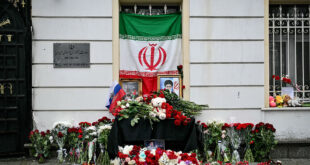Iran’s chief nuclear negotiator cancelled on Friday a trip to a conference in Germany where U.N. officials had hoped talks with European policy makers would secure a “time out” in a row over Tehran’s nuclear ambitions.
“We have heard that Mr (Ali) Larijani will not be coming to the conference due to illness,” Horst Teltschik, chief organiser of the Munich Security Conference, told Reuters.
Earlier, the U.N. nuclear watchdog chief Mohamed ElBaradei urged Iran and the West to avoid “an uncontrolled chain reaction” towards conflict and said he hoped a solution would be found at Munich talks.
German Foreign Ministry spokesman Martin Jaeger said the meeting had been arranged with an eye to a February 21 U.N. Security Council deadline for Iran to stop enriching uranium for nuclear fuel or risk broader financial sanctions.
Larijani had been expected to meet with German and EU officials as well as ElBaradei.
ElBaradei appealed to both sides to take a simultaneous “time out”, with Tehran suspending efforts to produce nuclear fuel and major powers their steps to carry out sanctions, to allay fears of a slide into a U.S.-Iran conflict.
Tehran says it is refining uranium only for power plant fuel. Western leaders suspect a disguised atom bomb project.
“There is an urgent need for creative diplomacy and leadership. A durable peaceful solution will not come through pressure only,” ElBaradei said in an interview with Germany’s Der Spiegel magazine released on Friday.
BALL OF FIRE
“If we only focus on sanctions … that confrontation (risks) ending in an uncontrolled chain reaction … In the Middle East today, where it’s like a ball of fire, you have to be very cautious,” ElBaradei said.
Iran has promised an announcement of “significant” nuclear progress on Sunday when it crowns 10 days of celebrations marking the anniversary of its 1979 Islamic revolution.
Washington is building up forces in the Gulf but says it is committed to diplomacy and has no intention of invading Iran.
ElBaradei said the “time out” could run for three months, allowing time for a comprehensive settlement covering not just nuclear issues but security and trade, which have polarised relations between Iran and the United States for 25 years.
A diplomat from a major EU power said it was possible a formula for a pause in enrichment and sanctions steps might be floated at the talks in Munich.
But the United States and Britain were concerned not to diverge from the Security Council demand on Tehran to shelve nuclear work first to earn trust lost by hiding enrichment research until 2003 and then impeding IAEA probes.
“The Security Council has been clear. If Iran takes the steps required, we can renew talks about a long-term agreement on the basis of (our) generous proposals made last year,” said a British Foreign Office official.
 Eurasia Press & News
Eurasia Press & News



